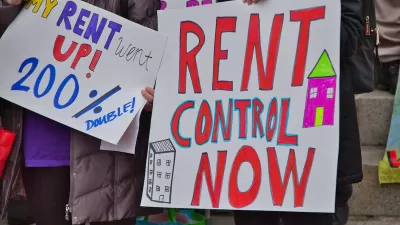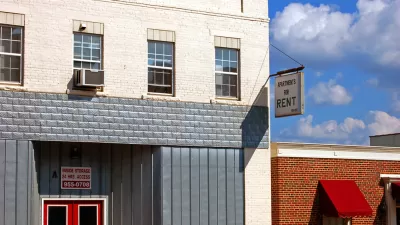Mayor Wu says putting a rent control policy in place is just one of several ways the city plans to improve housing affordability and prevent evictions, but the proposal requires state approval.

In a paywalled article in the Boston Globe, Yvonne Abraham describes Boston Mayor Michelle Wu’s fight to bring rent control back to the city, where it has been disallowed by state law since 1994.
According to Abraham, “The city’s draft plan, which has not yet been filed and could still change, would tie allowable rent increases to inflation by permitting landlords to raise rents each year by 6 percent plus the federal government’s Consumer Price Index,” with an overall cap of 10 percent. The proposal “would exempt new buildings for the first 15 years after they open, as well as small owner-occupied properties such as three-deckers.”
Critics of the proposal say it could slow new housing construction, but Wu says it is just one part of a broader strategy. As Wu explained to the Globe, “It serves a very specific purpose, which is to stop the worst cases of displacement and rent gouging so that we have the chance to get that new housing built and open for families to have more choices.”
Abraham explains that the proposal would need approval from the state legislature. If that fails, Wu could propose a new law allowing states to pursue rent stabilization on their own.
FULL STORY: Facing early pushback, Michelle Wu says her rent control proposal strikes proper balance

Maui's Vacation Rental Debate Turns Ugly
Verbal attacks, misinformation campaigns and fistfights plague a high-stakes debate to convert thousands of vacation rentals into long-term housing.

Planetizen Federal Action Tracker
A weekly monitor of how Trump’s orders and actions are impacting planners and planning in America.

Chicago’s Ghost Rails
Just beneath the surface of the modern city lie the remnants of its expansive early 20th-century streetcar system.

Bend, Oregon Zoning Reforms Prioritize Small-Scale Housing
The city altered its zoning code to allow multi-family housing and eliminated parking mandates citywide.

Amtrak Cutting Jobs, Funding to High-Speed Rail
The agency plans to cut 10 percent of its workforce and has confirmed it will not fund new high-speed rail projects.

LA Denies Basic Services to Unhoused Residents
The city has repeatedly failed to respond to requests for trash pickup at encampment sites, and eliminated a program that provided mobile showers and toilets.
Urban Design for Planners 1: Software Tools
This six-course series explores essential urban design concepts using open source software and equips planners with the tools they need to participate fully in the urban design process.
Planning for Universal Design
Learn the tools for implementing Universal Design in planning regulations.
planning NEXT
Appalachian Highlands Housing Partners
Mpact (founded as Rail~Volution)
City of Camden Redevelopment Agency
City of Astoria
City of Portland
City of Laramie





























